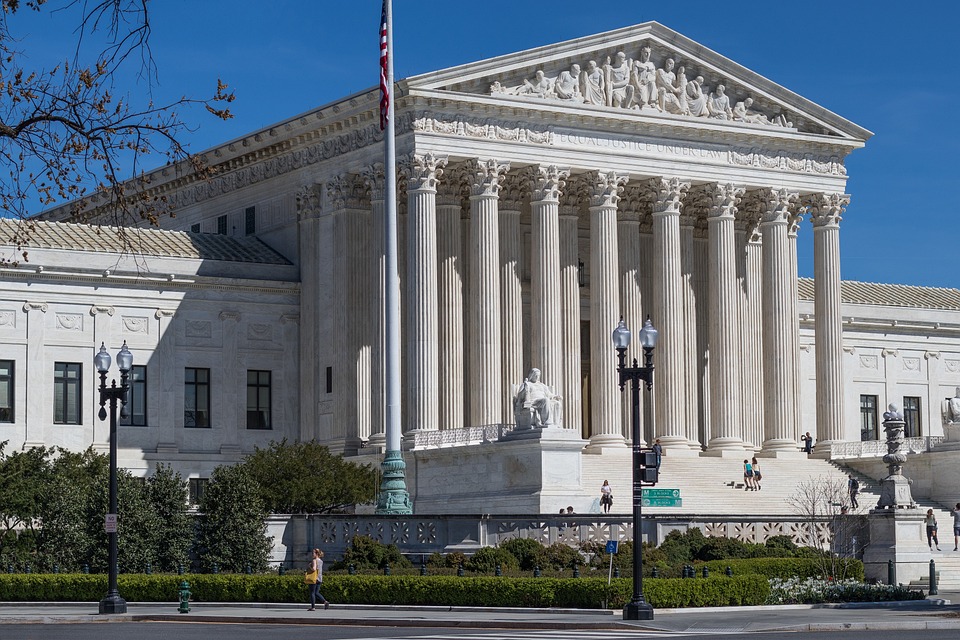The United States Supreme Court rejected to hear Turkey’s bid to dismiss two lawsuits filed against them by protesters from the 2017 demonstrations in Washington. The protesters who filed the suit accused Turkish security forces of injuring them in the protests that year.
The high court declined to hear Turkey’s appeal to dismiss the two lawsuits Monday filed against them by protesters from the 2017 demonstrations in Washington. At the time, the protesters alleged that they were injured by Turkish security forces during the visit of Turkish President Tayyip Erdogan. The justices declined to hear the appeal by Ankara on the lower court rulings allowing the lawsuits to proceed, rejecting Turkey’s argument of having immunity over such legal action in the US under the Foreign Sovereign Immunities Act.
The issue at hand involved members of Erdogan’s security detail clashing with some protesters during the 2017 demonstrations. The incident has since strained relations between the United States and Turkey. Turkey has blamed the clash on the protesters linked to the Kurdistan Workers’ Party.
The Biden administration has urged the Supreme Court not to hear Turkey’s appeal to dismiss the lawsuits, citing that when foreign security personnel use force in a manner that is unrelated to protecting the officials from harm, they are acting outside their legal protections.
The lower courts have since ruled against Turkey when Ankara sought to appeal. The US Court of Appeals in the DC Circuit back in 2021 ruled that while members of the Turkish security detail were within their rights to protect Erdogan, their actions did not meet the exception.
On the same day, the Conservative-majority of the Supreme Court also signaled skepticism on the legality of race-conscious admissions policies in cases involving Harvard University and the University of North Carolina that may make affirmative action programs used to boost Black and Hispanic students vulnerable.
The Supreme Court heard five hours of arguments by the group founded by anti-affirmative action activist Edward Blum of the lower court rulings that upheld the policies used by the two universities to promote diversity. The rulings are due by the end of June, with the three Liberal justices backing the limited use of race in admissions.



 Ohio Man Indicted for Alleged Threat Against Vice President JD Vance, Faces Additional Federal Charges
Ohio Man Indicted for Alleged Threat Against Vice President JD Vance, Faces Additional Federal Charges  India–U.S. Interim Trade Pact Cuts Auto Tariffs but Leaves Tesla Out
India–U.S. Interim Trade Pact Cuts Auto Tariffs but Leaves Tesla Out  Trump Lifts 25% Tariff on Indian Goods in Strategic U.S.–India Trade and Energy Deal
Trump Lifts 25% Tariff on Indian Goods in Strategic U.S.–India Trade and Energy Deal  China Warns US Arms Sales to Taiwan Could Disrupt Trump’s Planned Visit
China Warns US Arms Sales to Taiwan Could Disrupt Trump’s Planned Visit  Trump Allows Commercial Fishing in Protected New England Waters
Trump Allows Commercial Fishing in Protected New England Waters  Iran–U.S. Nuclear Talks in Oman Face Major Hurdles Amid Rising Regional Tensions
Iran–U.S. Nuclear Talks in Oman Face Major Hurdles Amid Rising Regional Tensions  Jack Lang Resigns as Head of Arab World Institute Amid Epstein Controversy
Jack Lang Resigns as Head of Arab World Institute Amid Epstein Controversy  U.S. Announces Additional $6 Million in Humanitarian Aid to Cuba Amid Oil Sanctions and Fuel Shortages
U.S. Announces Additional $6 Million in Humanitarian Aid to Cuba Amid Oil Sanctions and Fuel Shortages  Trump Allegedly Sought Airport, Penn Station Renaming in Exchange for Hudson River Tunnel Funding
Trump Allegedly Sought Airport, Penn Station Renaming in Exchange for Hudson River Tunnel Funding  US Pushes Ukraine-Russia Peace Talks Before Summer Amid Escalating Attacks
US Pushes Ukraine-Russia Peace Talks Before Summer Amid Escalating Attacks  Nighttime Shelling Causes Serious Damage in Russia’s Belgorod Region Near Ukraine Border
Nighttime Shelling Causes Serious Damage in Russia’s Belgorod Region Near Ukraine Border  Norway Opens Corruption Probe Into Former PM and Nobel Committee Chair Thorbjoern Jagland Over Epstein Links
Norway Opens Corruption Probe Into Former PM and Nobel Committee Chair Thorbjoern Jagland Over Epstein Links  Japan Election 2026: Sanae Takaichi Poised for Landslide Win Despite Record Snowfall
Japan Election 2026: Sanae Takaichi Poised for Landslide Win Despite Record Snowfall  TrumpRx Website Launches to Offer Discounted Prescription Drugs for Cash-Paying Americans
TrumpRx Website Launches to Offer Discounted Prescription Drugs for Cash-Paying Americans  Missouri Judge Dismisses Lawsuit Challenging Starbucks’ Diversity and Inclusion Policies
Missouri Judge Dismisses Lawsuit Challenging Starbucks’ Diversity and Inclusion Policies  South Korea Assures U.S. on Trade Deal Commitments Amid Tariff Concerns
South Korea Assures U.S. on Trade Deal Commitments Amid Tariff Concerns 































